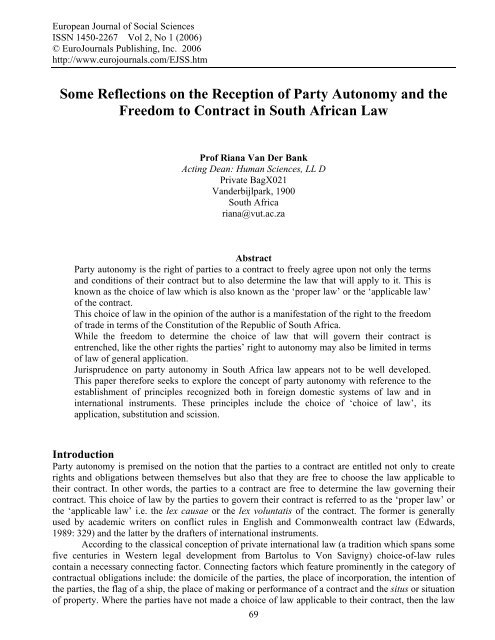EFFECT OF VITAMINS C AND E INTAKE ON BLOOD ... - EuroJournals
EFFECT OF VITAMINS C AND E INTAKE ON BLOOD ... - EuroJournals
EFFECT OF VITAMINS C AND E INTAKE ON BLOOD ... - EuroJournals
You also want an ePaper? Increase the reach of your titles
YUMPU automatically turns print PDFs into web optimized ePapers that Google loves.
European Journal of Social Sciences<br />
ISSN 1450-2267 Vol 2, No 1 (2006)<br />
© <strong>EuroJournals</strong> Publishing, Inc. 2006<br />
http://www.eurojournals.com/EJSS.htm<br />
Some Reflections on the Reception of Party Autonomy and the<br />
Freedom to Contract in South African Law<br />
Prof Riana Van Der Bank<br />
Acting Dean: Human Sciences, LL D<br />
Private BagX021<br />
Vanderbijlpark, 1900<br />
South Africa<br />
riana@vut.ac.za<br />
Abstract<br />
Party autonomy is the right of parties to a contract to freely agree upon not only the terms<br />
and conditions of their contract but to also determine the law that will apply to it. This is<br />
known as the choice of law which is also known as the ‘proper law’ or the ‘applicable law’<br />
of the contract.<br />
This choice of law in the opinion of the author is a manifestation of the right to the freedom<br />
of trade in terms of the Constitution of the Republic of South Africa.<br />
While the freedom to determine the choice of law that will govern their contract is<br />
entrenched, like the other rights the parties’ right to autonomy may also be limited in terms<br />
of law of general application.<br />
Jurisprudence on party autonomy in South Africa law appears not to be well developed.<br />
This paper therefore seeks to explore the concept of party autonomy with reference to the<br />
establishment of principles recognized both in foreign domestic systems of law and in<br />
international instruments. These principles include the choice of ‘choice of law’, its<br />
application, substitution and scission.<br />
Introduction<br />
Party autonomy is premised on the notion that the parties to a contract are entitled not only to create<br />
rights and obligations between themselves but also that they are free to choose the law applicable to<br />
their contract. In other words, the parties to a contract are free to determine the law governing their<br />
contract. This choice of law by the parties to govern their contract is referred to as the ‘proper law’ or<br />
the ‘applicable law’ i.e. the lex causae or the lex voluntatis of the contract. The former is generally<br />
used by academic writers on conflict rules in English and Commonwealth contract law (Edwards,<br />
1989: 329) and the latter by the drafters of international instruments.<br />
According to the classical conception of private international law (a tradition which spans some<br />
five centuries in Western legal development from Bartolus to Von Savigny) choice-of-law rules<br />
contain a necessary connecting factor. Connecting factors which feature prominently in the category of<br />
contractual obligations include: the domicile of the parties, the place of incorporation, the intention of<br />
the parties, the flag of a ship, the place of making or performance of a contract and the situs or situation<br />
of property. Where the parties have not made a choice of law applicable to their contract, then the law<br />
69
















